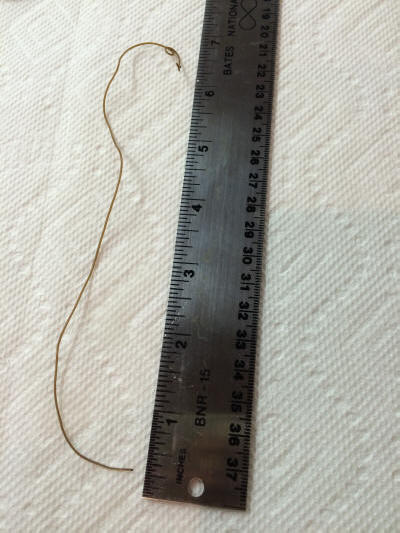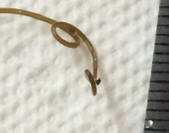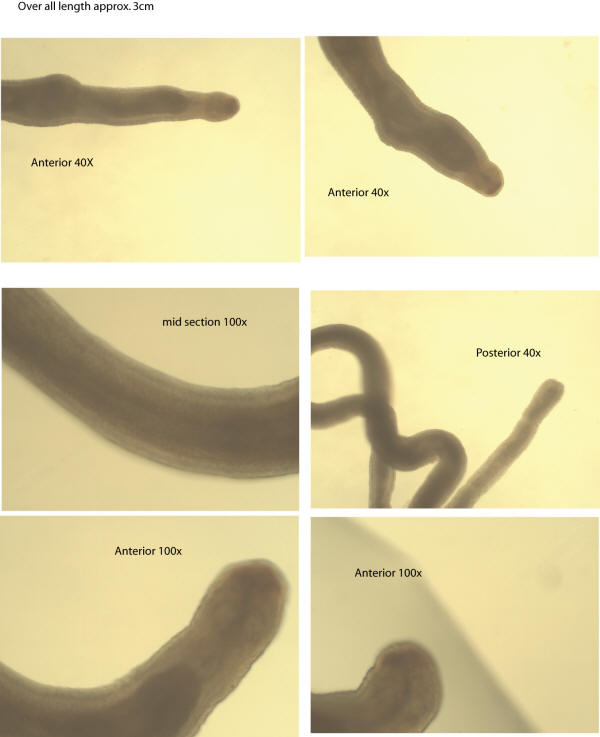|
Roundworm Identification
FAQs
Related FAQs: Worm Diversity FAQs, FAQs 2,
FAQs 3, & Worm IDs
1, Worm IDs
2, Worm IDs 3, Worm IDs 4,
Worm IDs 5, Worm IDs 6, Worm
IDs 7, Worm IDs 8, & Worm ID
FAQs by Group/Phylum: Flatworm
Identification ID, Nemertean,
Proboscis, Ribbon Worm ID, Nematomorpha, Horsehair Worm ID,
Acanthocephalans,
Thorny-headed Worm ID, Polychaete Identification, Polychaete ID 2, Tubeworm ID, Hirudineans, Leech ID, Sipunculids, Peanut Worm ID, Echiuran Worm ID,
Related Articles: Worms,
Polychaetes, Flatworms/Planaria,
|
Almost all are white... with smooth bodies,
semi-pointed ends... hard to distinguish front to back...
Internal parasites or free-living... if you can cut a coronal
section through the throat you'd find the buccal cavity is
triradiate... RMF
|
|
Unknown... worm?
12/29/14
After a rain on 9/9/14, while collecting earthworms from puddles on our
driveway found this. Wetland property with small pond & all types of
wildlife. 3 months & still alive in jar. Any idea what kind, any
referral for help in id?
Thank you
Amber Santangelo
<A worm of some sort; likely a Nematomorphan or
Nematode. Bob Fenner> |

 |
| worm 1/31/09 How's it going? <About as
fair as can tell> I pulled this worm (it was floating around)
out of my 120g reef while cleaning the tank. The worm is about 2-3
cm when stretched out and it diameter is less than a millimetre
when stretched but fattens up when it contracts. Attached is
microscopic pic. Could you identify it and should i be concerned of
its presence? thanks <What nice pix! This is almost certainly a
nematode/roundworm... Not likely deleterious, though I would remove
it/them myself. This phylum is a huge assemblage of free-living to
parasitic species... Much more on the Net. Thank you for sending
this along. Bob Fenner> |
 |
- That's 'Todes, not Toads - I have just
noticed about 7-9 extremely small parasitic trematodes (or flukes) in
my salt water reef tank. <Are they on your fish or around and
about?> What can I do? <Not all 'todes are necessarily
parasitic. Unless these are directly on your fish or you corals, I
wouldn't be too concerned.> I just put my black percula into the
tank yesterday after treating him with formaldehyde and malachite green
for a week. I just put the fish in the tank last night
before I saw any of the trematodes. I know they will begin
to multiple and ruin my fish tank if left alone. <Not
necessarily.> Although I do not have a lot of corals in there
currently, what I do have is precious and currently I have no where
else to place the corals to allow me to treat the tank with any
solution. <Perhaps it's time to obtain such equipment.> It is
a 29 gallon saltwater tank with an anemone, black percula, royal
Gramma, 10 blue legs and scarlet reef hermits, one serpent star, and a
couple corals (none of which have been purchased in the last 6
months). The ammonia = 0, nitrite = 0, pH = 8.3, alkalinity
= 8-10, calcium = 400ppm. How can I prevent the spread and overgrowth
of these unwanted parasites? <Again, I'm not convinced these are
parasitic - there are only a couple of treatments that work against the
'todes and if you must treat, you'll have to remove all the
invertebrate livestock from the tank. Fenbendazole, Piperazine, and
Praziquantel are the most common treatments for nematodes and Cestodes,
but are typically administered in baths for the affected fish. I'd
keep a very close eye on things for the mean while, looking for
problems with the fish, not necessarily just crawling around.>
Jennifer
<Cheers, J -- >
|
|

